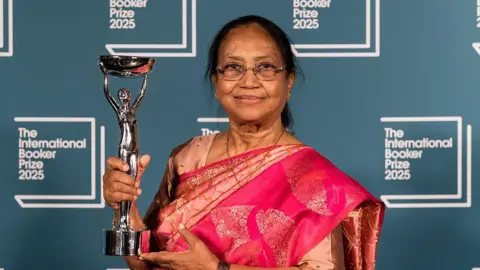Indian writer, lawyer, and activist Banu Mushtaq has made history by winning the International Booker Prize for her short story anthology, *Heart Lamp*. This achievement is unprecedented as it marks the first time a book written in Kannada, predominantly spoken in Karnataka, has won this esteemed award. Translated into English by Deepa Bhasthi, *Heart Lamp* comprises twelve short stories authored by Mushtaq over a span of three decades, from 1990 to 2023, depicting the challenges faced by Muslim women in southern India.
This award comes on the heels of Geetanjali Shree’s Hindi novel *Tomb of Sand* winning the same prize in 2022. Mushtaq’s literary contributions have garnered admiration among readers; the Booker International recognition, however, has amplified her visibility, shining a light on the personal and societal challenges reflected in her stories, which often grapple with themes of religious conservatism and patriarchal society.
A review in the Indian Express captures the essence of Mushtaq's writing: "In a literary culture that rewards spectacle, *Heart Lamp* insists on the value of attention — to lives lived at the edges, to unnoticed choices, to the strength it takes simply to persist." Mushtaq, having grown up in a small Muslim neighborhood in Karnataka, faced an uphill battle in achieving her education and literary aspirations against societal norms that often confined women to domestic roles. Her father played a pivotal role in her education by enrolling her in a convent school where she learned in Kannada.
Though she began writing during her school years, her journey to publication came during challenging periods in her life. Her first short story was published shortly after she married at 26, a time overshadowed by personal struggles, including postpartum depression and societal expectations that stifled her aspirations.
In a candid interview, she recounted a moment of desperation that nearly led to self-harm, only stopped when her husband intervened, emphasizing her ongoing battles with the constraints of her domestic life. The characters in *Heart Lamp* reflect a spirit of defiance and resilience. Mushtaq’s portrayal of Muslim women distinguishes them from typical literary tropes of suffering, showcasing their endurance and quiet rebellion in daily life.
Her career has not come without obstacles; following her vocal support for women's rights within religious spaces, she faced threats to her safety, including a fatwa and physical attacks. Despite these challenges, her resolve to write truthfully about the intersection of gender, religion, and society remains unshaken.
Over the years, Mushtaq has published a remarkable body of work, including six short story collections, a novel, and an essay collection, receiving numerous awards such as the Karnataka Sahitya Academy Award. In 2024, her compilation *Haseena and Other Stories*, translated into English, was honored with the PEN Translation Prize, further cementing her role as a significant voice in contemporary literature. Mushtaq continues to address pressing societal issues, underscoring that while contexts may evolve, the fundamental struggles of women and marginalized communities persist.


















